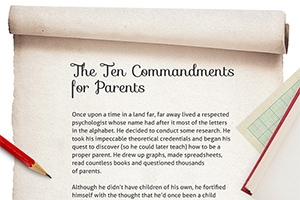5 Tips for Being a Patient Parent
Relax about your parenting skills - they're not as bad as you fear!
 "You are a rubbish parent!" courtesy of mdanys
"You are a rubbish parent!" courtesy of mdanysThe screaming; oh, the screaming! When will it end? And why is that middle-aged woman looking at me as if I'm Satan's morally inferior poor relation?
You see, before you ever become a parent, you are oh so very judgemental of those who really are parents. Like someone who has yet to pass their driving test assuming they wouldn't make the same mistakes as 'those silly NASA astronauts'. It's so easy to judge when you've yet to tread the parental path.
"Tut tut! What an awful parent for losing their temper! If only they had brought little Johnny up properly, he wouldn't now be screaming like that!"
Well, anyone who has had a child will know it doesn't quite work like that. Children do exasperate you. The problem is, they have minds of their own! And sometimes, no matter how understanding, reasonable, and morally didactic you are, they still behave like Fagin's urchins from Oliver Twist (even after you've read the latest childrearing bestseller). It really isn't always the parents' fault. No, really!
The fact that children are not entirely controllable through 'right parenting' can come as a seismic shock to the new idealistic parent. They soon learn, don't they?
Yes, they really can drive you nuts
Imagine being around an adult 24/7 with whom you couldn't reason, who screamed when they didn't get their own way but were unable to tell you exactly what they wanted, who purposefully tried to make themselves heavier when you lifted them up... Okay, that would be a weird adult relationship, but you get my drift.
Don't get me wrong; child abuse is never justified! And certainly parental boundaries, tough but fair parameters, do tend to make children happier, more secure, and better behaved. And affection and love are vitally important.
And of course children can be delightful, cute, funny, inspiring, and infinitely lovable... which makes it all the worse when they sometimes drive you to distraction.
So from one who has been there; who has counselled hundreds of guilt-ridden, 'at the end of their tether' parents; and who has had to learn to be more patient, here are some tips to help you help yourself help your child by being more patient:
1) Give yourself a break
If you are with your child all the time, then you never get to 'refuel' and of course you'll run out of patience eventually. And when we become very angry, we are not best placed to make rational decisions. Why? Because any strong emotion will block clear, rational thinking (1).
After you become very angry, it takes your mind and body around 30 minutes to fully calm down. So even if you feel calm after ten, you'll still be physiologically 'wound up', which means you might find yourself losing it again instantaneously until your body has really had a chance to calm down. If you've really lost your patience with your child and there is someone else to keep an eye on them, then go and cool off. But if you are alone with them...
2) Count to ten and start again
If you find yourself becoming more exasperated than a farmer trying to herd cats, then try switching focus for a moment (even if they are shouting like a sugar-addicted banshee).
Focus on breathing out - breathe in, of course! But lengthen and extend the out-breath. Do this a few times whilst counting to ten. The natural breathing response when you become exasperated is to take a sharp in-breath and keep breathing in - this is how we breathe when we are angry or anxious. We naturally sigh (an extended out-breath) when we become stressed - this is nature's way of helping us de-stress.
Breathing out slowly will calm you down very quickly. You can even practice this now. Counting to ten just ensures your 'thinking brain' is still engaged, which will further dilute any anger.
3) Be patient with yourself
Repeat after me: "I am only human."
And that's true. "If I was a proper parent, I wouldn't ever get mad" is an illusion, a delusion, and confusion of the issue. If you didn't sometimes lose patience or even get really angry...now, that would be strange. Unless of course you have one of those rare children who never winds you up. So give yourself a break of another kind by pre-empting guilt with my affirmation... "I-am-only-human!"
4) See the bigger picture
Keep in mind the pre-politically-correct era song 'A Hymn to Him', which includes the sentiment, "Why can't a woman be more like a man!" (2) When we get frustrated and feel unable to reason with little Damien, it's all too easy to feel as if he is being wilfully difficult by not seeing reality the way an adult would. The point is, very young children don't care what other people might think of them screaming all the way through your weekly supermarket shop.
The capacity to reason and develop 'theory of mind' (which is a fancy way of saying 'being able to appreciate that other people might have a different point of view') doesn't really develop properly until the age of about five to seven. And the prefrontal lobes in the brain aren't completely 'wired in' until the age of about 21! (Which is why teenagers can be about as sensitive to others as a rampaging bull during a Japanese tea ceremony.)
Remember children are supposed to be completely unreasonable sometimes. This is not an excuse for all bad behaviour, but something to cling to when your tether's end is in danger of slipping from your grasp.
5) Rehearse being more patient
It's all very well for me to sit here calmly tapping out these words with no demanding children around me (my kids are well and truly grown). In the heat of the moment, you can still snap, no matter what wise words you've read. But if you can rehearse typical triggers in your mind and envisage not losing your patience but remaining calm and in control, then you train the brain to automatically retain more self-control in these times.
And finally, I think we all do well to remember these wise words of Ogdan Nash:
Children aren't happy with nothing to ignore,
And that's what parents were created for.
References
- Termed 'emotional hijacking'. See Daniel Goleman's book Emotional Intelligence: Why it can matter more than IQ.
- Performed by Rex Harrison in the film My Fair Lady.



